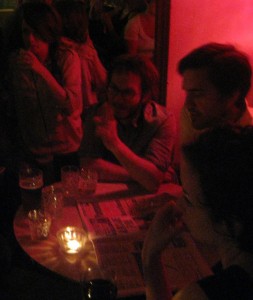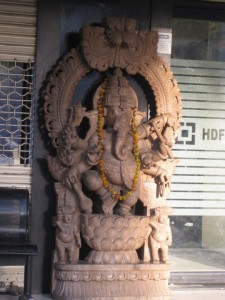 You can’t tell, when you look at me looking at something, what it is that I am noticing. Even if you could list all the material features of my sensory field, you wouldn’t know whether I’m noticing the cup, or the room, or the fact that I’m in a city, or the unpleasant manner of that man’s behaviour, or my own insecurity in your company.
You can’t tell, when you look at me looking at something, what it is that I am noticing. Even if you could list all the material features of my sensory field, you wouldn’t know whether I’m noticing the cup, or the room, or the fact that I’m in a city, or the unpleasant manner of that man’s behaviour, or my own insecurity in your company.
Our perception has this interesting feature, that our object is perceived through the specifics of our experiential field. I see the meeting through the chairs and the people, I see the city through the buildings and the traffic, I see his obnoxious character through his behaviour, I see myself through my experiences.
So many different sorts of things appear! Most obviously, things appear, but, through and beyond them, a world appears. And through your body–a “thing”–you appear. Your kindness can appear–and of course your beauty–and, saddest of all, your absence can be what appears through everything in my room when you are away.
 Typically, we think of things as where our perception stops: indeed, the body that rises in front of me blocks my vision of what is on its other side. But what we should notice instead is that things are where our perception starts! Rather than blocking our vision, things are what allow deeper realities to appear.
Typically, we think of things as where our perception stops: indeed, the body that rises in front of me blocks my vision of what is on its other side. But what we should notice instead is that things are where our perception starts! Rather than blocking our vision, things are what allow deeper realities to appear.
The artwork is a special instance of a thing. Like any thing, it is a window on deeper realities, but, most basically, the deeper reality it reveals is this very nature of things. In the artwork, it is precisely this “see-through” character of things that is made thematic. The artwork is the annunciation of the metaphysical transparency of things.


 Participants in these
seminars consistently have the experience of growth in their conversation and
conceptual abilities, and typically leave with a transformed sense of the nature
and possibilities of philosophy.
Participants in these
seminars consistently have the experience of growth in their conversation and
conceptual abilities, and typically leave with a transformed sense of the nature
and possibilities of philosophy.





One Comment
This post is so important. It seems so often we get caught up in things as “that stuff,” when, as you note, things are really about how things matter to us. If we lose something, it tends, as you again suggest, to be the loss of a way of being that is really at issue. Your point about art at the end reminds me of certain things that Collingwood argues in _The Principles of Art_, especially his point that we often mistake the artwork for the thing on the wall or the movement of the bodies on the stage, when in truth art is the movement within us that allows us to move toward the articulation of new meaning (the articulation of an emotion that had previously been opaque to us, he specifically argues). Perception, you both argue, is about grasping and even developing meaning, not about being bombarded by matter. Yes. I agree. It’s remarkable, too, how loudly “stuff” seems to announce itself as what matters. (I feel like I’m in a course on Derrida again with you now!)